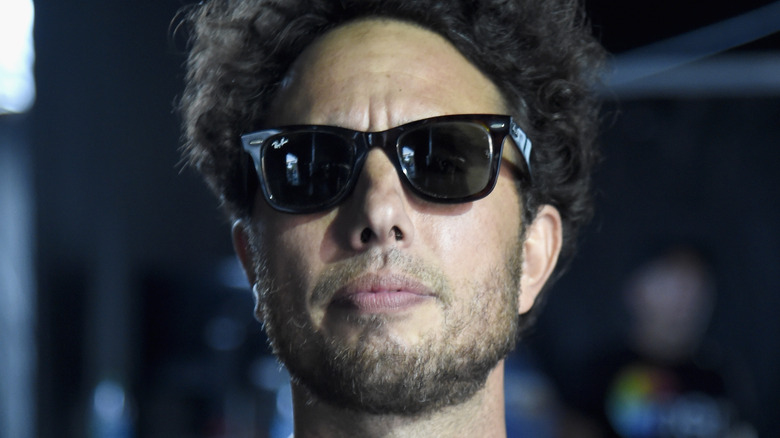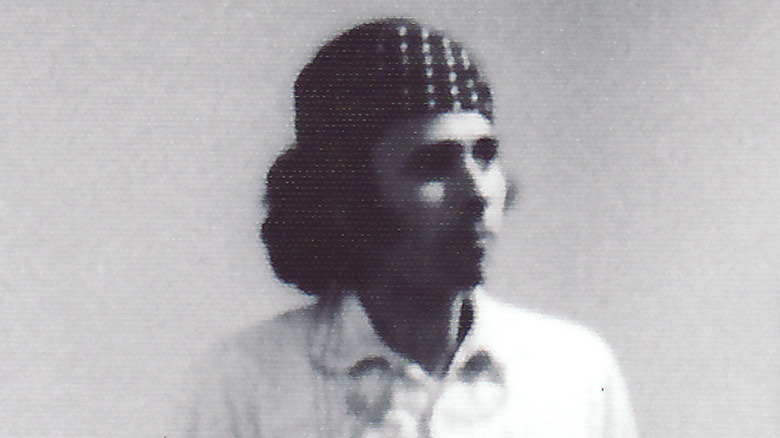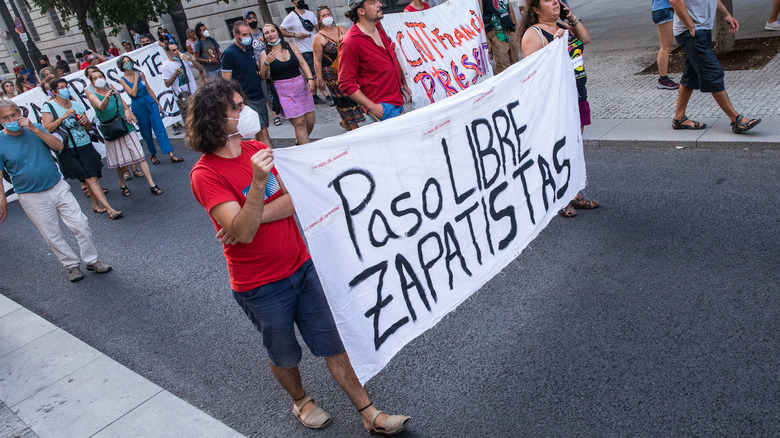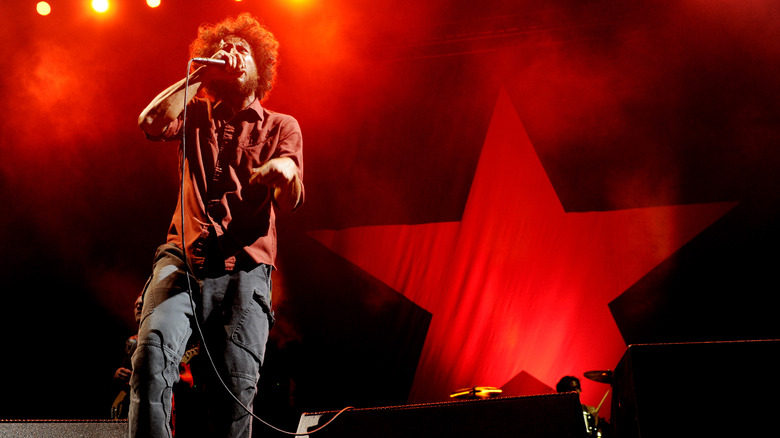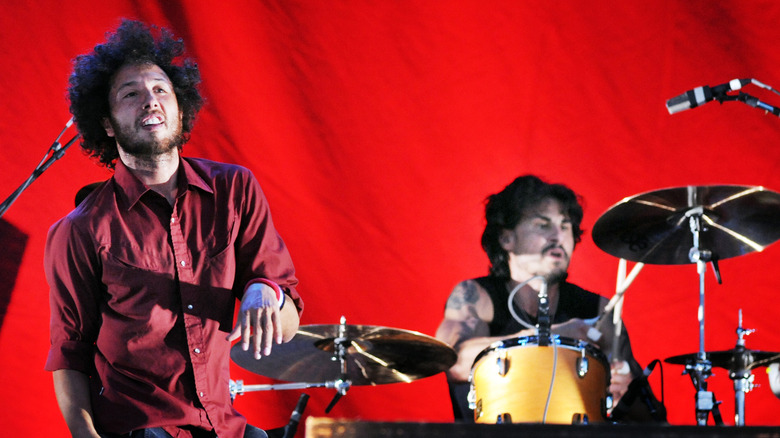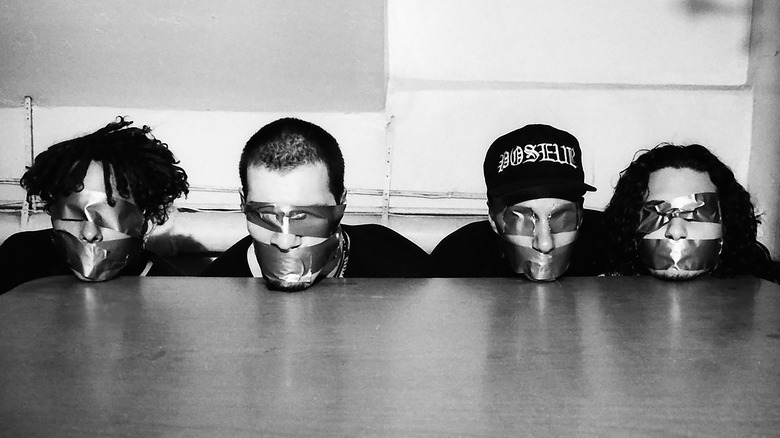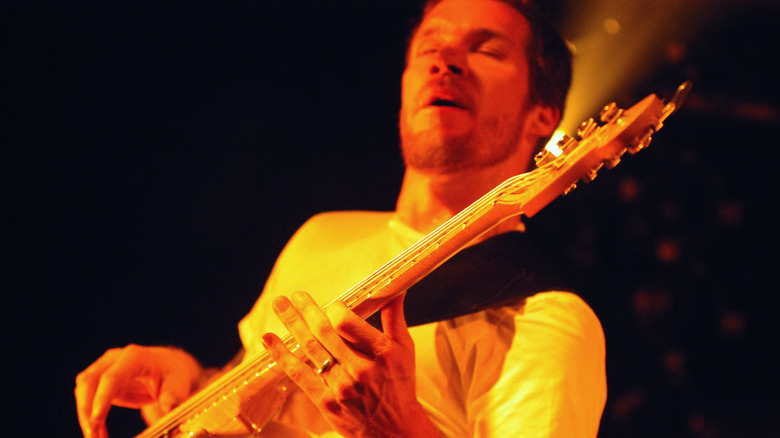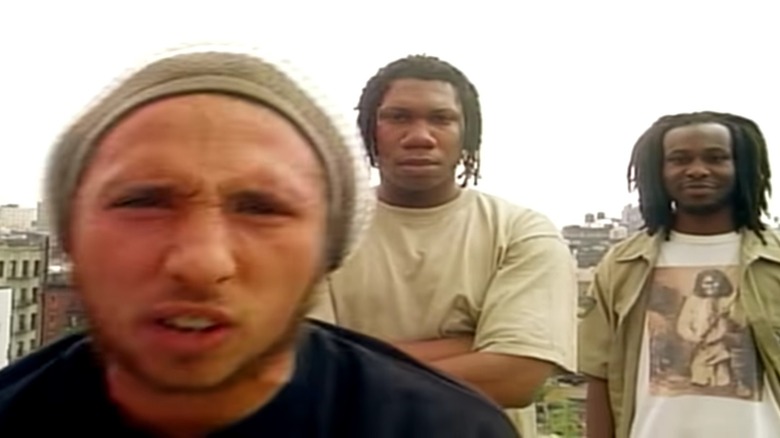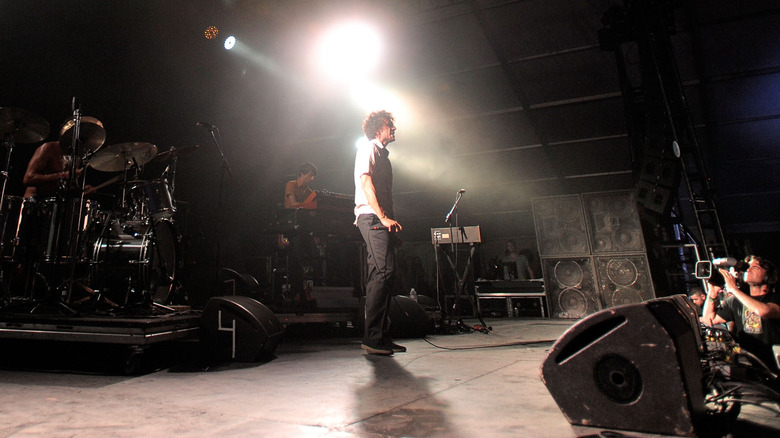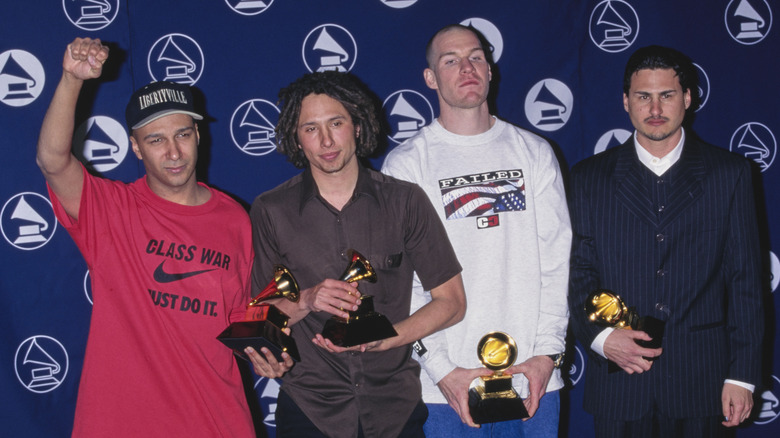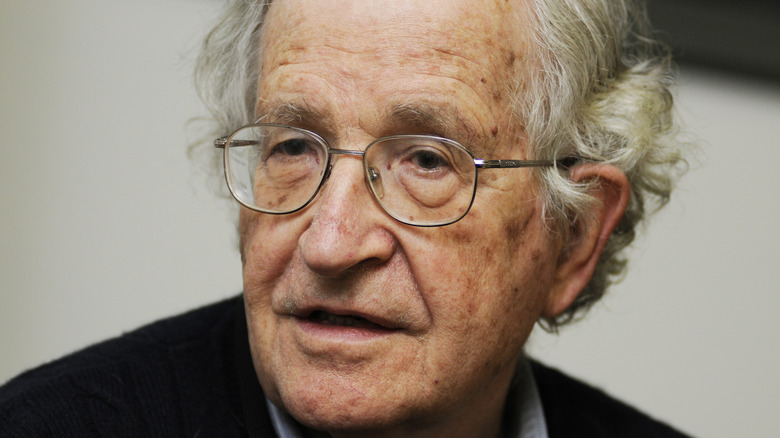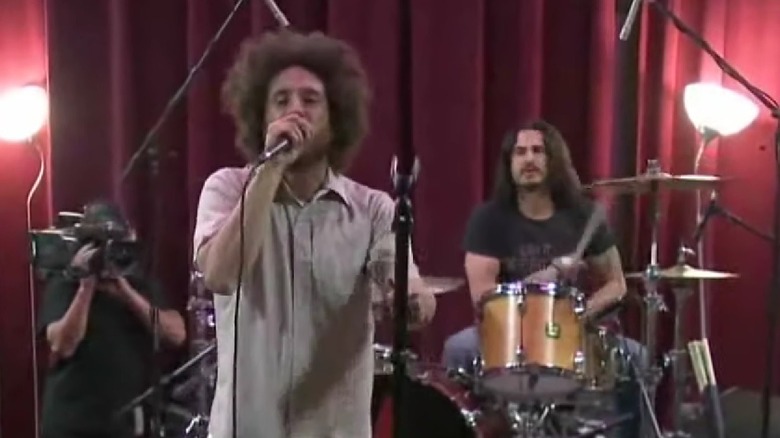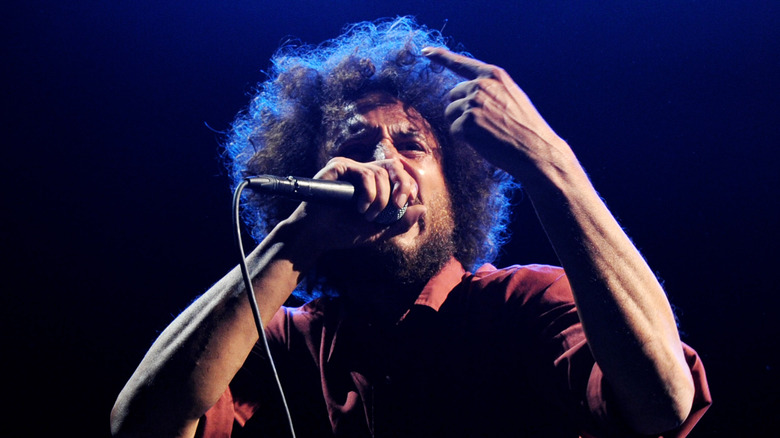The Untold Truth Of Zack De La Rocha
For over three decades, Zack De La Rocha has been known as the incendiary, razor-tongued front man for rap-rock outfit Rage Against the Machine, one of the most purely political bands ever. Name a weighty social issue — militarized police forces, racism, income inequality, American interference in foreign wars — and it's a sure bet that De La Rocha has offered his opinion on it, loudly and aggressively, and with levels of incisiveness and skill that could make the most successful rappers hang their heads in shame.
From his early years to the heights of Rage's success to his current-day status as something approaching a rock elder statesman, De La Rocha has never failed to remain true to himself as an artist and activist, stand up against injustice, and just rock flagrantly hard. Here's the untold truth of the most talented, principled man in rock — Rage Against the Machine's Zack De La Rocha.
Zack de la Rocha has artists and revolutionaries in his family
Plenty of artists' creative and philosophical leanings appear to come out of nowhere, but Zack De La Rocha doesn't come from a family of fishermen or tax auditors. The roots of his music run strong in his family, and he's spoken at length about his father and great-grandfather in particular — the former an influential artist, and the latter a literal revolutionary, a fighter in the Mexican Revolution of the early twentieth century.
According to Hyperallergic, Robert "Beto" De La Rocha, Zack's father, was a member of the legendary Los Angeles art collective Los Four, whose 1974 exhibition at the Los Angeles County Museum of Art ignited that decade's Chicano art movement. In a 1998 interview with journalist Jesus Ramirez Cuevas (via Music Fan Clubs), Zack explained his family tree's influence on his worldview and his art. "My father is a Chicano muralist ... His attempts at trying to build bridges between the artists in Los Angeles, the workers, and Chicanos against Vietnam, led me politically towards the National Liberation movements," he said. "Also, my Sinaloan grandfather was a revolutionary fighter who fought in the Mexican Revolution ... He was an agricultural laborer in Silicon Valley, California. His working days lasted from 15 to 16 hours daily, sweating and subjected to poverty ... I see his experience reflected in the testimonies of the Zapatistas, the indigenous peasant rebels who struggle every day to make a living."
He identifies with the Zapatistas political movement
In an interview, Zack De La Rocha spoke at length about the Zapatistas, whose movement has inspired him personally and politically. According to the Australian Institute of International Affairs, the Zapatista Army of National Liberation originated in the region of Chiapas, where the indigenous population has long struggled for independence from the Mexican government, which it believes to be illegitimate, and against which it fought a brief but intense war in 1994.
De La Rocha has made multiple trips to the region, and he described his harrowing experiences. "We saw how the soldiers burned and razed the fields, threw the children out of schools, and turned the schools into barracks," he said. "And I realized that the motives behind the militarization were to break down the community, to keep the people from organizing in an autonomous manner in order to overcome poverty and isolation ... We also saw the threat and daily intimidation suffered by the communities ... My experience in Chiapas inspired me to write back in the United States — the songs 'The Wind Below' and 'Without a Face' from our second album, 'Evil Empire.'"
Zack de la Rocha's political activism began in high school
While his trips to Chiapas certainly sharpened his view of government abuses in the United States, Zack De La Rocha's decidedly left-leaning politics were formed much earlier. In an interview with veteran music journo Rob Tannenbaum (via Music Fan Clubs), he described his experiences after his mixed-race family relocated from East L.A. to the lily-white Orange County city of Irvine — a place he called "One of the most racist cities imaginable ... If you were a Mexican in Irvine, you were there because you had a broom or a hammer in your hand."
As one of the few non-white kids in his high school, De La Rocha remembered having intense feelings of alienation, which were only compounded one day at school, with an eye-wateringly racist joke made in class — not by a fellow student, but by his teacher. Said teacher — again, in front of a class full of students — referred to California's border checkpoint using a racial slur, stunning De La Rocha into silence. Unknowingly, this racist idiot may have been directly responsible for giving us a whole lot of great music. "I remember it like it was yesterday," De La Rocha told Tannenbaum. "I remember being very silent and feeling as if I could do nothing to raise my voice. At that point, I decided that when I started a band, I would never be silent again." Indeed, he was not.
He's a multi-instrumentalist
To say that Zack De La Rocha's voice is among the most distinctive in all of rock would be a wild understatement. It basically has three modes: Whisper, Scream, and Ear-Shattering Bellow of the God of Anger, and very little about it has changed over the years. Even the most die-hard Rage-head could be forgiven, though, for underestimating his talent — because when it comes to instruments, the dude can play just about anything.
De La Rocha has been in plenty of bands both before Rage and during the band's hiatus, and in all of them, he's contributed something other than vocals. In his teens, De La Rocha played guitar in the hardcore band Hard Stance (via Rest Assured), and for a brief time, he sat in on drums for another hardcore outfit which went by the incredible name of No For An Answer (via Music Times). In 2008, De La Rocha formed a super-duo of sorts, One Day As a Lion, with Mrs Volta and Queens of the Stone Age drummer Jon Theodore; in addition to providing vocals, he went ahead and played keyboards on the band's sole EP release, because why not (via Billboard). Due to the absence of a guitarist or bassist in the band, those keys were tasked with filling up a whole lot of sonic space, but it should come as no surprise that De La Rocha had no trouble with that.
Zack de la Rocha's blown-out voice led to an infamous moment
If you're among Rage's older fans, you'll remember the most confounding and controversial moment in the band's early history: their, er, performance at Lollapalooza in 1993. The band was slotted in for a brief 15-minute set, but there was a slight problem with Zack De La Rocha's voice. That is to say, it totally failed to show up after the previous evening's concert in Rhode Island.
Faced with either canceling the gig or finding a replacement singer on short notice, the band went with an unlikely third option. This was, you see, during the time when the government body known as the PMRC, or Parents' Music Resource Center, was cracking down on explicit lyrics as part of their ongoing war on music. Rage was unsurprisingly not in favor of their activities, and since De La Rocha couldn't voice his displeasure, the band decided to demonstrate it visually by taking the stage with their mouths duct taped, stark naked, with the letters "PMRC" painted on their chests, for the duration of their time (via Vice). Speaking to the press after the fact, guitarist Tom Morello explained, "The performance that day was more, um, performance art than a rock concert. The point we were hoping to make was that you can't take it for granted that you'll be able to hear music that challenges the status quo. People are trying to rob you of those First Amendment rights."
He walked away from Rage after one highly public incident
As might be expected from the world's angriest band, the relationships between the members of Rage weren't always totally harmonious. In 2000, the guys were pretty much on top of the freakin' world, having released three brilliant and well-received albums (1992's "Rage Against the Machine," 1996's "Evil Empire," and 1999's "The Battle of Los Angeles"), but behind the scenes, there was some head-butting going on. According to Louder Sound, the band's well-known internal tensions came to a head on September 12, 2000, after they performed at the MTV Video Music Awards.
In an interview with Loudwire in 2015, bassist Tim Commerford remembered taking issue with the fact that Rage's awesome, Michael Moore-directed video "Sleep Now In the Fire" looked poised to lose the Best Metal Video award to "Break Stuff" by Limp Bizkit, whom Commerford called "the dumbest band in the history of music." Indeed, the Bizkit boys won, prompting Commerford to follow through on an action he told his disapproving bandmates and Moore he would take: He climbed up on a towering stage decoration behind Fred Durst and crew as they were accepting the award, shaking it as if trying to drop it on their heads. Zack De La Rocha walked out of the ceremony at that point, and not two months later, he announced his intention to leave Rage, saying that their "decision making process [had] completely failed."
He's done a lot of straight hip-hop collaborations
Although Rage helped pave the way for a number of rap-rock bands to emerge from the '90s, few would argue that the Bizkits and their ilk have little in common with them musically, philosophically, or in any other way other than the presence of electric guitars and rapping. Perhaps this is because, as hard as he is inclined to rock, Zack De La Rocha has always been a rapper at heart — as evidenced by the many collaborations with hardcore MCs that you may not have known existed.
As one might guess, De La Rocha didn't go seeking out Will Smith or Young MC for his rap collabs. In 1999, he hooked up with Philadelphia rapper Last Emperor, along with legendary MC and fellow political firebrand KRS-One, for the single "C.I.A. (Criminals In Action)," a pleasant little ditty that gave the business to that shadiest of American intelligence organizations. He went on to contribute verses to deep cuts by revered Oakland crew Blackalicious and supergroup Deltron 3030, and in recent years, he's found a creative kinship with the acclaimed duo Run the Jewels. Zack has appeared on no fewer than three RTJ tracks: 2014's "Close Your Eyes (And Count to F***)," 2016's "A Report to the Shareholders/KillYour Masters," and 2020's "Ju$t." As it turns out, there's a reason for this: De La Rocha's relationship with RTJ producer and MC El-P actually reaches back more than two decades.
Zack de la Rocha's solo album never materialized
In 2016, Zack De La Rocha dropped a solo track, "Digging for Windows," featuring El-P's unmistakable production. At that time, according to Pitchfork, El-P took to Twitter to promise that there was "more where that came from" — but De La Rocha, unfortunately, made a fibber out of him. For the next couple of years, the expected solo album stubbornly failed to appear, and in 2019, it was reported by the Peoples Party podcast (via Alternative Nation) that the project had been permanently shelved.
During the podcast, El-P dropped a shocker on the audience. "It's interesting, a lot of people don't know [this], but right when [Rage] broke up, Zack straight up just came to Brooklyn and lived in my apartment for like a month," he said. "He wanted to work with [me] on a solo record ... It was probably great for me, and not so great for Zack. There were five of us living in my apartment, I was making beats in my bedroom. He didn't leave with much music." The situation may not have been conducive to creating magic, but it was the beginning of a decades-long friendship. "Let's be real, at the peak of Rage, he could have literally gone to any producer on the planet," he pointed out. "He came to my apartment in Brooklyn, that's how real Zack is. He is one of my best friends, I consider him to be family."
He's a two-time Grammy winner
The Grammy Awards have a history of failing to honor politically-oriented music (see: Public Enemy), but Rage has proven impossible for them to ignore. (Hey, it's not like Rage has ever been easy for anyone to ignore.) The band has been nominated a whopping nine times, according to the Grammys' official website, and they have taken home two statues: Best Metal Performance for "Tire Me" in 1997, and Best Hard Rock Performance for "Guerrilla Radio" in 2001.
For Zack De La Rocha's part, he has remained silent on the two wins, preferring as he often does to let Tom Morello do the talking, which it took him all of a quarter-century to do. His remarks, posted to Instagram on the occasion of the 25th anniversary of the release of "Evil Empire," spoke volumes about the band's approach to making music. Accompanied by a picture of a cheap-looking guitar and amplifier, Morello posted, "This guitar/amp combo was used to record 'Tire Me' on [our] Evil Empire album ... The guitar, which I'm not even sure is made out of wood (plywood?) cost 40 Canadian dollars at a Toronto pawn shop and the amp is a 20 watt solid state practice amp I had in my apartment. The song won our first Grammy."
He once interviewed Noam Chomsky
If there is one name besides Zack De La Rocha's that is sure to have right-wing, ultra-capitalist types shaking in their boots, it is Noam Chomsky. The author of a metric ton of books critical of far-right ideology, capitalism, and the media, Chomsky has spent decades earning his reputation as one of the most intelligent men alive, with a thick humanist streak underlying his (very) far-left philosophy. Needless to say, his works have been an influence on De La Rocha's worldview — and in 1999, the rocker got the chance to interview his hero.
As one might expect, the pair's political views lined up quite nicely, and in spite of their titanic differences in age and background, they became good friends, according to Far Out. De La Rocha led off the conversation by saying, "Noam Chomsky is the most ... intellectual [person] alive today. His books have made me understand the nature of globalization and its effects on people and societies throughout the world." At Coachella in 2007, De La Rocha paraphrased one of Chomsky's more controversial views. "A friend of ours said if the same laws were applied to U.S. Presidents as were applied to the Nazis after World War II, that every single one of them, every last rich white one of them, from Truman on, would be hung to death and shot. And this current administration is no exception. They should be hung and tried and shot as war criminals." Seems like a touch of overkill, but you go ahead and argue with him.
Don't expect Zack de la Rocha to censor himself ... ever
The Christmas Number One is a time-honored U.K. tradition in which popular tunes — often of the novelty or Christmas variety — jockey for the top position on the U.K. singles chart, as the Yuletide season has long been a peak time for record sales there. In 2009, BBC Radio staged a contest between Rage Against the Machine's classic "Killing In the Name" and "The X Factor" winner Joe McElderry's "The Climb" to see whose song could achieve the feat. Rage was invited to perform their cheerful ditty live in the studio, on one condition: that the band substitute replacement lyrics for the song's infamous, repeated refrain, "F*** you, I won't do what you tell me." You may be able to guess how this went.
Obviously, Rage agreed, only to perform the song exactly as written, annoying British censors and shattering monocles across the land (via Digital Spy). As it turns out, Zack De La Rocha and the boys aren't big on censorship, of the self-imposed variety or otherwise; perhaps the chaps at the BBC should have examined the lyrics in question before assuming that Rage would do what said chaps told them. If the incident similarly annoyed British music fans, however, they have a delightfully odd way of showing it. According to Genesis Publications, in a 2021 poll, "Killing In the Name" was selected as the favorite Christmas Number One of all time.
Injury couldn't keep him down
After three decades and counting, it sure seems like Zack De La Rocha intends to keep rocking fans' faces off and raging against the machine until such time as the music gods call him home. Such is his commitment to his craft that even injury won't prevent him from rocking and raging — even when said injury occurs right in the middle of a show.
At the second stop on Rage's reunion tour in Chicago in 2022, the rapper injured his leg during the fourth song of the set, having to support himself on a drum riser to finish the tune (via Yahoo! News). A lesser performer might have ended the angry fun right then and there, but not De La Rocha. Frustrated but undeterred, he hauled out a chair, took a seat, and proclaimed, "I don't know what happened to my leg right now, straight up. But you know what? We're gonna keep this s*** going, if I have to crawl across this stage. You came too f***ing far. You guys ready? Let's go." He then proceeded to go full throttle as Tom Morello helpfully took center stage, and Rage finished their set with their friends (and openers) Run the Jewels cheering them on along with the rest of Chicago.
Because that, dear reader, is how revolutionaries get down.
